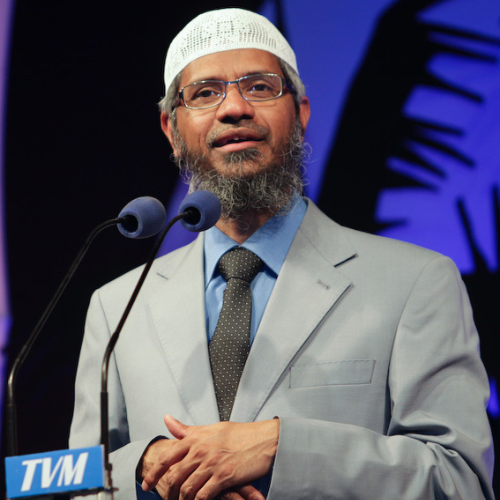In a move that has ignited controversy and debate, Zakir Naik, the fugitive Islamic preacher wanted in India on charges of money laundering and incitement to religious hatred, has arrived in Pakistan. His visit, which comes at the invitation of the Pakistani government, is marked by a series of public lectures and high-level meetings, including an encounter with Prime Minister Shehbaz Sharif. This development raises significant questions about religious extremism, regional diplomacy, and the complexities of counterterrorism efforts in South Asia.
Background on Zakir Naik
Zakir Naik, a prominent Islamic speaker and the founder of the controversial television channel PeaceTV, has been accused of promoting extremist views through his speeches. Since 2016, he has been wanted by India’s National Investigation Agency (NIA) for money laundering and for allegedly inciting violence through hate speech. His inflammatory rhetoric has been linked to several instances of religious violence, leading to the banning of PeaceTV in countries like India, Bangladesh, and Sri Lanka. Furthermore, Naik has faced entry bans in several Western countries, including the United Kingdom and Canada, due to his controversial views.
Zakir Naik’s teachings emphasize a strict interpretation of Islam, and his lectures often draw large crowds, particularly among younger audiences. His influence, however, has also raised alarms among governments and civil society groups who fear that his messages may foster radicalization.
The Pakistani Tour
Upon his arrival at Islamabad International Airport, Zakir Naik was warmly received by high-ranking officials, including the Chairman of the Pakistan Prime Minister’s Youth Program and the Additional Secretary of the Ministry of Religious Affairs. His visit includes a month-long tour across major Pakistani cities like Islamabad, Karachi, and Lahore, where he is scheduled to deliver public lectures. Notably, his son, Fariq Naik, an Islamic scholar, will accompany him on this tour, further solidifying their influence in Pakistan.
The Pakistani government’s invitation to Naik highlights the complex interplay between religion and politics in the country. Pakistan has often positioned itself as a defender of Islamic values, and Naik’s return is seen as an endorsement of his controversial stance on various issues, including interfaith dialogue and religious interpretation.
Diplomatic Repercussions
Zakir Naik’s presence in Pakistan is not without diplomatic ramifications. The Indian government has expressed its discontent, as Naik remains a fugitive sought for prosecution on serious charges. Indian officials are concerned that his activities in Pakistan may further radicalize segments of the population and undermine ongoing counterterrorism efforts in the region.
Biden Warns Israel Against Dangerous Strike on Iran’s Nuclear Sites
Malaysian Prime Minister Anwar Ibrahim, who previously indicated that his country would not condone terrorism, has stated that Malaysia would take action if sufficient evidence against Naik is presented. This statement adds another layer of complexity, as it highlights the international dimension of Naik’s activities and the challenges of addressing extremism that transcends national borders.
Reactions from Civil Society
The return of Zakir Naik to Pakistan has provoked mixed reactions within Pakistani society. While some see him as a champion of Islamic thought, others express concern about the potential for his rhetoric to incite violence and deepen sectarian divides. Human rights organizations and secular groups have raised alarms, arguing that Naik’s teachings could perpetuate intolerance and extremism.
Moreover, his visit comes at a time when Pakistan is grappling with its own challenges related to terrorism and religious extremism. The country has faced multiple incidents of violence linked to radical groups, and the government’s engagement with controversial figures like Naik raises questions about its commitment to combating extremism.
Zakir Naik’s return to Pakistan is emblematic of the broader challenges faced by South Asian nations in addressing issues of religious extremism and radicalization. His high-profile tour not only highlights the complexities of domestic politics but also the intricate relationships between religion, governance, and international diplomacy. As Naik engages with audiences across Pakistan, the potential for his influence to either incite or calm tensions remains a critical concern for policymakers and citizens alike.
In navigating the delicate landscape of religious discourse, Pakistan must consider the implications of endorsing figures like Naik. The stakes are high, as the nation balances the preservation of its cultural identity with the pressing need to foster tolerance and peace in a region often marred by sectarian violence. The ongoing developments surrounding Naik’s activities will undoubtedly shape the discourse on extremism and religious leadership in South Asia for years to come.


